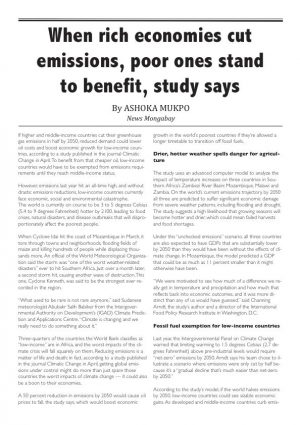 If higher and middle-income countries cut their greenhouse gas emissions in half by 2050, reduced demand could lower oil costs and boost economic growth for low-income countries, according to a study published in the journal Climatic Change in April. To benefit from that cheaper oil, low-income countries would have to be exempted from emissions requirements until they reach middle-income status.
If higher and middle-income countries cut their greenhouse gas emissions in half by 2050, reduced demand could lower oil costs and boost economic growth for low-income countries, according to a study published in the journal Climatic Change in April. To benefit from that cheaper oil, low-income countries would have to be exempted from emissions requirements until they reach middle-income status.
However, emissions last year hit an all-time high, and without drastic emissions reductions, low-income countries currently face economic, social and environmental catastrophe.
The world is currently on course to be 3 to 5 degrees Celsius (5.4 to 9 degrees Fahrenheit) hotter by 2100, leading to food crises, natural disasters, and disease outbreaks that will disproportionately affect the poorest people.
When Cyclone Idai hit the coast of Mozambique in March, it tore through towns and neighborhoods, flooding fields of maize and killing hundreds of people while displacing thousands more. An official of the World Meteorological Organization said the storm was “one of the worst weather-related disasters” ever to hit Southern Africa. Just over a month later, a second storm hit, causing another wave of destruction. This one, Cyclone Kenneth, was said to be the strongest ever recorded in the region.
“What used to be rare is not rare anymore,” said Sudanese meteorologist Abubakr Salih Babiker from the Intergovernmental Authority on Development’s (IGAD) Climate Prediction and Applications Centre. “Climate is changing and we really need to do something about it.”
Three-quarters of the countries the World Bank classifies as “low-income” are in Africa, and the worst impacts of the climate crisis will fall squarely on them. Reducing emissions is a matter of life and death; in fact, according to a study published in the journal Climatic Change in April, getting global emissions under control might do more than just spare those countries the worst impacts of climate change — it could also be a boon to their economies.
A 50 percent reduction in emissions by 2050 would cause oil prices to fall, the study says, which would boost economic growth in the world’s poorest countries if they’re allowed a longer timetable to transition off fossil fuels.
Drier, hotter weather spells danger for agriculture
The study uses an advanced computer model to analyze the impact of temperature increases on three countries in Southern Africa’s Zambezi River Basin: Mozambique, Malawi and Zambia. On the world’s current emissions trajectory, by 2050 all three are predicted to suffer significant economic damage from severe weather patterns, including flooding and drought. The study suggests a high likelihood that growing seasons will become hotter and drier, which could mean failed harvests and food shortages.
Under this “unchecked emissions” scenario, all three countries are also expected to have GDPs that are substantially lower by 2050 than they would have been without the effects of climate change. In Mozambique, the model predicted a GDP that could be as much as 11 percent smaller than it might otherwise have been.
“We were motivated to see how much of a difference we really get in temperature and precipitation and how much that reflects back into economic outcomes, and it was more distinct than any of us would have guessed,” said Channing Arndt, the study’s author and a director of the International Food Policy Research Institute in Washington, D.C.
Fossil fuel exemption for low-income countries
Last year, the Intergovernmental Panel on Climate Change warned that limiting warming to 1.5 degrees Celsius (2.7 degrees Fahrenheit) above pre-industrial levels would require “net-zero” emissions by 2050. Arndt says his team chose to illustrate a scenario where emissions were only cut by half because it’s a “gradual decline that’s much easier than net-zero by 2050.”
According to the study’s model, if the world halves emissions by 2050, low-income countries could see sizable economic gains. As developed and middle-income countries curb emissions, they would have to cut back on fossil fuel consumption, which would sharply lower the price of oil on world markets. If low-income countries were allowed to benefit from those low oil prices by being granted a temporary exemption from restrictions on their emissions, they could see higher GDP growth than they otherwise would have experienced.
In Mozambique, the study predicts low oil prices could mean a GDP that’s around 2 to 3 percent higher than it would have been even under a hypothetical scenario where its climate didn’t change at all, and much larger than the contracted economy it’s on course for now.
Arndt says the benefits of cheaper oil would extend to nearly all of the 31 low-income countries. But to benefit from those low prices, they would need wealthy and middle-income countries to agree to allow them to be initially exempted from a global emissions reduction plan.
That isn’t a far-fetched scenario, says Timmons Roberts, director of the Climate and Development Lab at Brown University. The 2015 Paris Agreement, for example, already contains language acknowledging the “special circumstances” low-income countries face in joining mitigation efforts. “I think it’s fairly non-controversial that they would have a right to keep burning fossil fuels longer than anyone else,” he said.
Roberts says transitioning to green energy is politically challenging, and wealthy nations should prioritize efforts to finance that transition in low-income countries sooner rather than later. But in the absence of that assistance, for those countries “it probably is cheaper to keep burning fossil fuels.”
Altogether, the 31 low-income countries in the world generate only 0.67 percent of global GDP. Arndt says this means that even if they are exempted from emissions regulations until they graduate to middle-income status, they’d still be “hard pressed to come to more than 1% of current global emissions.”
For those countries to benefit from low oil prices caused by a reduction in global emissions, however, the world would have to dramatically shift course and wean itself off of fossil fuels. For the moment, that seems unlikely, with emissions hitting an all-time high last year. The study is part of a growing body of work that uses data to illustrate the links between carbon emissions and economic development in the global south. In April, researchers at Stanford University published a paper showing that warming trends have already made inequality between the world’s richest and poorest countries worse than it would have been without today’s higher temperatures.
For Anabela Lemos, director of the Mozambican environmental organization Justiça Ambiental, the two cyclones that hit her country in March and April were a grim sign of Southern Africa’s vulnerability to the impacts of climate change, and the need for wealthy nations to take the problem seriously.
“What developed countries owe not only to Mozambique but to the rest of the planet is to stop emissions,” she says. “People will feel the effects of these cyclones for years. They lost everything.”
Ashoka Mukpo
Originally published
by News Mongabay
August 3, 2019


